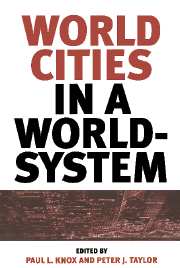Book contents
- Frontmatter
- Contents
- List of contributors
- Preface
- Part 1 Introduction: world city, hypothesis and context
- Part 2 Cities in systems
- Part 3 Politics and policy in world cities: theory and practice
- 12 Re-presenting world cities: cultural theory/social practice
- 13 Theorizing the global–local connection
- 14 The disappearance of world cities and the globalization of local politics
- 15 World cities and global communities: the municipal foreign policy movement and new roles for cities
- 16 The environmental problematic in world cities
- 17 The successful management and administration of world cities: mission impossible?
- Appendix The world city hypothesis
- Index
15 - World cities and global communities: the municipal foreign policy movement and new roles for cities
Published online by Cambridge University Press: 07 October 2009
- Frontmatter
- Contents
- List of contributors
- Preface
- Part 1 Introduction: world city, hypothesis and context
- Part 2 Cities in systems
- Part 3 Politics and policy in world cities: theory and practice
- 12 Re-presenting world cities: cultural theory/social practice
- 13 Theorizing the global–local connection
- 14 The disappearance of world cities and the globalization of local politics
- 15 World cities and global communities: the municipal foreign policy movement and new roles for cities
- 16 The environmental problematic in world cities
- 17 The successful management and administration of world cities: mission impossible?
- Appendix The world city hypothesis
- Index
Summary
In March 1993, less than a month before the World Cities in a World-System conference, a full-page advertisement in the New York Times asked rhetorically why the Japanese transnational corporation Nissan Shatai is trying to evict eighty ethnic Korean families from the village of Utoro near Kyoto in Japan. The villagers are descendants of conscripted labourers brought from Korea during the Second World War. Despite having lived in Japan for decades, the family members cannot vote and suffer discrimination of the sort that faces immigrant workers in many countries. The land on which their homes stand was sold by Nissan to developers in 1987, and efforts have been made to clear the site since then. With its cross-national message — written in English by ethnic Koreans living in Japan, addressed to American car buyers — this advertisement constitutes a powerful metaphor for our chapter.
By taking their plight to the readers of the New York Times, the Koreans blur familiar concepts: global, local, foreign, and domestic. Although this is a local — even parochial — story (how many readers of the advertisement could even locate Kyoto on a map of South-east Asia?), it possesses global veracity, as the organized racism leading to brutal attacks on ‘guest-workers’ in Germany indicates.
- Type
- Chapter
- Information
- World Cities in a World-System , pp. 267 - 279Publisher: Cambridge University PressPrint publication year: 1995
- 11
- Cited by



